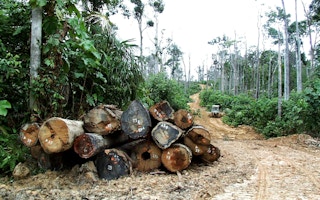Illegal logging of rainforests on the Indonesian island of Sulawesi surged by 70 per cent in 2020, according to findings by local NGO JURnal Celebes.
The group attributes the increase to monitoring activities by forestry authorities being scaled back as part of wider mobility restrictions imposed in response to the Covid-19 pandemic.
Illegal logging is especially rampant in the region of Mahalona Raya in East Luwu district, at the nexus of the k-shaped island, according to Mustam Arif, director of JURnal Celebes.
Locals have reported an increased in logging activities in the region, including the sound of chainsaws and daily truck traffic. Most of the logs are transported to sawmills in Wawondula village.
According to JURnal Celebes, illegal logging has occurred for a long time in Mahalona, but increased in intensity during the pandemic.
Mustam said locals in Towuti subdistrict in Mahalona also clear forests to plant black pepper.
“This commodity’s price has been high in the past few years even though it’s fluctuating,” he said. “Locals in East Luwu are very enthusiastic about planting black pepper.”
Muhammad Amin, a forestry official overseeing law enforcement in Sulawesi for the Ministry of Environment and Forestry, said the pandemic had made it harder for law enforcers to do their work, with virtual monitoring not as effective as on-the-ground monitoring. Verifying and investigating reports is also much harder to do remotely, he added.
Mustam said the government should work together with local communities by involving them in forest monitoring.
“We recommend to not ignore illegal logging as it continues to degrade forests and slowly it will cause disasters, climate change and the loss of biodiversity and food sources,” he said.
From 2000 to 2017, South Sulawesi lost 335,038 hectares (827,897 acres) of rainforest, an area three times the size of Hong Kong, with illegal logging being one of the main drivers of deforestation there.
Political players
While JURnal Celebes found locals were involved in cutting down trees, it says the scale of the clearing suggests they may be funded by well-resourced businesspeople.
“
Locals who log trees will be nabbed by officers if they don’t have the time to flee. They’ll be prosecuted. Meanwhile, businesspeople are rarely prosecuted even though they’re actually the owners of the illegal logs.
Mustam Arif, director, JURnal Celebes
It also found a high degree of coordination in the collection of the illegally logged wood and its subsequent transportation by truck to pooling stations or directly to mills. This indicates the activity is likely an organised crime.
Despite this, it’s often locals who are arrested by law enforcers, while the businesspeople profiting from the illegal logging enjoy impunity, according to Mustam.
“Locals who log trees will be nabbed by officers if they don’t have the time to flee. They’ll be prosecuted,” he said. “Meanwhile, businesspeople are rarely prosecuted even though they’re actually the owners of the illegal logs.”
Mustam said these actors likely avoid prosecution by bribing the locals to stay silent. Another explanation is that the locals genuinely don’t know who the actors behind the operations are.
“Observers suspect the actors from the buyer side or people behind the illegal timber business are able to break the chain [of information] to cover their footsteps,” Mustam said.
Of all the illegal logging cases monitored by JURnal Celebes, only one case featured a non-villager perpetrator being arrested by authorities. In that event, a forest encroachment violation in a conservation area in Ko’mara village, Takalar district, police initially arrested a local, who was subsequently tried and convicted in court.
Police then developed the case further, which led them to the deputy speaker of the Takalar legislative council, Muhammad Jabir Bonto. They charged him in the case in early 2021.
Jabir, a senior member of the Golkar Party, is suspected of cutting down trees in the conservation area without permits.
Slump in legal logging
As illegal logging ramps up, the legal logging industry is experiencing a slump, with businesses’ revenue taking a hit of up to 70 per cent during the pandemic, according to JURnal Celebes.
Mustam attributed the slowdown to decreasing demand, as well as a surplus of supply from illegal loggers flooding the market and undercutting legitimate businesses.
If this situation is left unaddressed, illegal logging and the illegal timber trade will continue to flourish, affecting the implementation of Indonesia’s timber legality verification system, or SVLK, which was introduced in 2009, Mustam said.
The SVLK system is meant to ensure all parties in the timber supply chain obtain their wood and timber products from sustainably managed forests and conduct their trading operations in accordance with existing laws and regulations. But more than a decade since the SVLK came into force, a small amount of timber from illegally logged areas still enters the legal supply chain.
“From 25 companies monitored by JURnal Celebes, there are only six that have SVLK certificates,” Mustam said.
JURnal Celebes called on the government to ramp up law enforcement in the region and increase the local implementation of the SVLK system.
“Because this [SVLK] is the best instrument in the world in sustainable forest management to curb deforestation rate,” Mustam said.
This story was published with permission from Mongabay.com.












